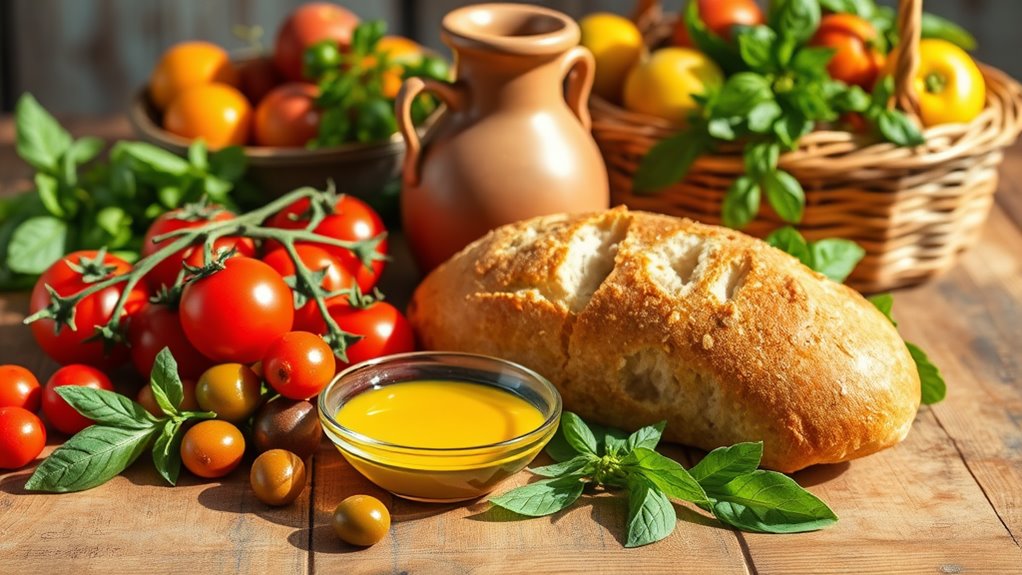The Mediterranean Diet focuses on whole, nutrient-dense foods that benefit your health and well-being. It emphasizes fruits, vegetables, whole grains, healthy fats like olive oil, and lean proteins such as fish and poultry. By adopting this diet, you can lower the risk of heart disease and diabetes while managing your weight effectively. This approach promotes mindful eating and encourages social connections, enhancing your overall quality of life. Embrace diverse and flavorful recipes that celebrate this rich culinary tradition. There's much more to discover about the Mediterranean Diet and its impact on your health and lifestyle choices.
Key Takeaways
- The Mediterranean Diet emphasizes whole foods, including fruits, vegetables, whole grains, and healthy fats, promoting balanced nutrition and overall well-being.
- Key components include olive oil, nuts, lean proteins like fish, and dairy products such as yogurt and cheese.
- This diet is linked to reduced risk of heart disease, diabetes, and supports weight management through nutrient-dense food choices.
- Meal planning can enhance culinary enjoyment by incorporating diverse flavors, herbs, and cooking techniques like grilling and roasting.
- The Mediterranean Diet embodies cultural traditions that value community, family, and sustainability, promoting a holistic approach to eating and living.
Overview of the Mediterranean Diet

The Mediterranean Diet is more than just a meal plan; it's a lifestyle that emphasizes whole foods and balanced nutrition. When you adopt this way of eating, you're not just choosing delicious meals; you're also embracing a healthier life. Studies show that this diet is rich in fruits, vegetables, whole grains, and healthy fats, which can lead to substantial nutritional benefits. You'll find that these foods are packed with essential vitamins, minerals, and antioxidants that support overall health.
One of the most appealing aspects of the Mediterranean Diet is its effectiveness in weight management. By focusing on nutrient-dense foods rather than processed options, you're likely to feel fuller for longer. This can help you resist the temptation of unhealthy snacks and maintain a balanced caloric intake.
Research indicates that people who follow this diet tend to have lower body mass indexes (BMIs) and better weight control compared to those who don't.
Moreover, the Mediterranean Diet encourages mindful eating and social connections, which can enhance your overall well-being. Sharing meals with family and friends fosters a sense of belonging, making the dietary changes feel more enjoyable and sustainable.
As you explore into this lifestyle, you'll discover that it's not just about what you eat, but how you approach food itself. With its focus on nutritional benefits and weight management, the Mediterranean Diet offers a fulfilling path to a healthier you, all while connecting you with a vibrant community of fellow enthusiasts. Additionally, adopting a plant-based diet can further enhance the health benefits associated with this lifestyle.
Key Components of the Diet

Embracing the Mediterranean Diet means incorporating a variety of key components that contribute to its health benefits. This diet emphasizes nutritional balance, allowing you to enjoy flavorful cuisine while nourishing your body. Let's explore the essential elements that make this diet both healthy and enjoyable.
| Component | Description |
|---|---|
| Fruits & Vegetables | A wide array of colorful fruits and vegetables, packed with vitamins, minerals, and antioxidants. Aim for at least five servings a day. |
| Whole Grains | Foods like whole grain bread, brown rice, and quinoa provide fiber and essential nutrients, promoting overall health. |
| Healthy Fats | Olive oil is a staple, along with nuts and seeds, which provide heart-healthy fats and enhance flavor. |
This combination not only promotes a sense of belonging through shared meals but also encourages you to explore new tastes and textures. Lean proteins like fish and poultry take center stage, while red meat is enjoyed in moderation. Dairy, especially yogurt and cheese, adds a creamy touch, enriching your meals. Incorporating more whole-food sources of protein can enhance the nutritional profile of your meals.
Health Benefits of the Mediterranean Diet

Adopting the Mediterranean Diet not only brings a variety of flavors to your plate but also offers numerous health benefits that can enhance your overall well-being. Research shows that this diet is associated with significant disease prevention, especially for chronic conditions like heart disease and diabetes. By focusing on whole foods, healthy fats, and lean proteins, you're setting yourself up for a healthier, longer life.
One of the main advantages of the Mediterranean Diet is its positive impact on heart health. Studies have demonstrated that individuals who follow this dietary pattern tend to have lower blood pressure and reduced cholesterol levels. This can lead to a decreased risk of heart attacks and strokes, promoting longevity.
Weight management is another essential benefit. The Mediterranean Diet encourages the consumption of nutrient-dense foods, which can help you feel satisfied while maintaining a healthy weight. Unlike restrictive diets, this approach allows you to enjoy a wide range of foods, making it easier to stick with in the long run.
Moreover, the Mediterranean lifestyle emphasizes physical activity and social connections, which can further contribute to your well-being. Engaging in regular exercise and sharing meals with friends and family can enhance your mental health and overall quality of life. Additionally, independent research confirms the effectiveness of the 3X Diet System, providing another avenue for achieving weight loss and health goals.
Foods to Embrace

When you immerse yourself in the Mediterranean Diet, you'll discover a rich array of foods that not only tantalize your taste buds but also nourish your body. This diet emphasizes whole, unprocessed foods that promote a healthy lifestyle. You'll find that embracing these ingredients can lead to flavorful recipes that bring family and friends together.
Here's a quick reference to help you choose the best foods to include in your Mediterranean lifestyle:
| Food Group | Examples |
|---|---|
| Fruits | Berries, citrus, melons |
| Vegetables | Spinach, tomatoes, bell peppers |
| Whole Grains | Quinoa, brown rice, barley |
| Healthy Fats | Olive oil, nuts, avocados |
Incorporating these foods isn't just about what you eat; it's about creating connections. Gather your loved ones and prepare meals together, sharing recipes that highlight the vibrant flavors of the Mediterranean. You'll appreciate how these ingredients not only enhance your dishes but also foster a sense of community and belonging. Additionally, embracing oxidized cholesterol can be beneficial for heart health as it helps reduce the risk of plaque buildup.
With each bite, you'll find yourself savoring the goodness of the Mediterranean Diet. So, immerse yourself in these delicious foods and explore the culinary traditions that make this diet not only a way of eating but a way of living. Embracing these foods can lead to a healthier you and a richer connection with those around you.
Foods to Avoid

While the Mediterranean Diet celebrates a variety of wholesome foods, it's equally important to recognize what to limit or avoid for best health. Steering clear of certain items can help you stay aligned with the diet's principles and enhance your overall well-being.
First, processed foods like sugary snacks, sodas, and fast food are best avoided. These items tend to be high in unhealthy fats, sugars, and sodium, which can undermine your health goals. Additionally, nutrition myths often promote low-fat or fat-free products as healthier options, but many of these contain added sugars and preservatives that can be detrimental.
You should also limit red meat and processed meats. While occasional consumption is fine, excessive intake can lead to health issues. Instead, focus on lean proteins like fish and legumes, which are staples of the Mediterranean way of eating.
Refined grains should be another focus for avoidance. White bread, pastries, and many breakfast cereals lack the nutritional benefits found in whole grains, contributing to blood sugar spikes and cravings. The glycemic index of wheat is among the highest of all foods, making it crucial to choose alternatives that align with your health goals.
Lastly, if you have any dietary restrictions, be mindful of how they affect your food choices within the Mediterranean framework. For instance, those with gluten sensitivities can opt for gluten-free grains like quinoa or brown rice, ensuring you still reap the diet's benefits without compromising your health.
Meal Planning Tips

Effective meal planning is essential for successfully following the Mediterranean Diet, allowing you to make informed choices that align with its principles. Start by creating a weekly meal plan that includes a variety of fruits, vegetables, whole grains, legumes, and healthy fats like olive oil. This diversity not only provides essential nutrients but also keeps your meals exciting and flavorful.
Incorporate different cooking techniques to enhance your dishes. Grilling, roasting, and steaming are excellent methods that preserve the nutritional value of ingredients while adding delicious flavors. Experiment with herbs and spices instead of relying on heavy sauces or salt, which aligns with the Mediterranean philosophy of fresh, vibrant cuisine.
Portion control is another key aspect of meal planning. While Mediterranean meals are often shared, it's important to be mindful of serving sizes. Use smaller plates to help regulate portions and avoid overeating. Aim to fill half your plate with vegetables and fruits, one-quarter with whole grains, and the remaining quarter with lean proteins like fish or poultry.
Consider prepping meals in advance. By preparing ingredients like chopped vegetables or cooked grains ahead of time, you'll save time during the week and make it easier to stick to your meal plan. Additionally, maintaining a healthy balance of gut bacteria can support your overall well-being, which is essential for preventing conditions like Chronic Kidney Disease.
Mediterranean Diet Recipes

Creating a meal plan is just the beginning of enjoying the Mediterranean Diet; the real joy comes from the delicious recipes that embody its principles. You'll find that Mediterranean recipes are packed with vibrant flavors and wholesome ingredients, making them both satisfying and nutritious. From fresh salads to hearty grain bowls, these flavorful dishes not only delight your taste buds but also promote overall well-being.
One of the great aspects of cooking Mediterranean is the flexibility it offers. Don't hesitate to make ingredient swaps based on what you have on hand. For instance, if a recipe calls for chickpeas, but you've got lentils instead, go ahead and substitute! You'll still maintain that essential Mediterranean flair. Try a classic Greek salad, swapping feta cheese for a plant-based alternative if you prefer a dairy-free option.
Another easy recipe is the Mediterranean quinoa bowl, where you can mix quinoa, roasted vegetables, and a drizzle of tahini sauce. Feel free to switch out vegetables based on the season or your personal preferences.
When you cook these dishes, you're not just following a diet—you're embracing a lifestyle that invites connection and community. Sharing these meals with friends or family can enhance the experience, fostering a sense of belonging. So gather around the table, enjoy the vibrant flavors, and celebrate the health benefits of the Mediterranean Diet together. Additionally, adopting a Mediterranean diet can lead to numerous long-term benefits for overall health, similar to those seen in ketogenic diets.
Cultural Significance

The Mediterranean Diet is deeply rooted in the rich cultural traditions of the region, reflecting centuries of history and social practices. When you explore this diet, you're not just looking at a set of food choices; you're engaging with a lifestyle that emphasizes community, family, and sustainability. The act of sharing meals, often centered around fresh, locally sourced ingredients, fosters connections among family and friends.
Historically, food in the Mediterranean has served as more than sustenance; it's been a medium for cultural expression and social rituals. Festivals, family gatherings, and communal events often revolve around culinary traditions, celebrating local produce and seasonal flavors. This shared experience enhances your sense of belonging, as it invites you into a world where food is an essential part of social identity.
Additionally, the Mediterranean Diet embodies a connection to the land and its history. Many of the ingredients, such as olives, grains, and seafood, reflect the agricultural practices and fishing traditions that have been passed down through generations. By adopting this diet, you're embracing these ancient practices, contributing to a broader cultural narrative that values health and well-being. Furthermore, the principles of sustainability in food sourcing resonate with the values of hand sharpening, emphasizing quality and craftsmanship.
In essence, the Mediterranean Diet is a tapestry woven from history and traditions, inviting you to partake in a lifestyle that honors the past while nurturing the present. It's a celebration of community, connection, and the joy of sharing good food, making it an enriching choice for anyone seeking to deepen their cultural ties.
Transitioning to the Diet

Embarking on the Mediterranean Diet can feel like an exciting exploration into a world of vibrant flavors and wholesome ingredients. You'll find that it's not just about altering what you eat; it's about embracing a lifestyle that celebrates community, health, and joy. To make this progression smoother, you'll want to create a solid shopping guide that emphasizes fresh produce, whole grains, lean proteins, and healthy fats.
Here are a few inspiring facets of this adventure:
- Ripe fruits and veggies bursting with color and nutrients
- A feeling of togetherness through shared meals and traditions
- The pleasure of cooking with simple, wholesome ingredients
- Trying out new recipes that excite your taste buds
- Feeling invigorated and healthier every day
When it comes to meal preparation, don't hesitate to make recipe substitutions that align with your preferences. For instance, swap out red meat for fish or legumes, and use olive oil instead of butter. These small adjustments can help you gradually adjust to the diet while still enjoying your preferred dishes.
As you immerse yourself in this culinary journey, remember that it's about balance and moderation. You're not just adjusting your diet; you're nurturing a deeper connection with food, your well-being, and the individuals around you. Embrace this chance to explore new flavors and develop lasting habits that nourish both body and soul. Your Mediterranean adventure awaits! Additionally, understanding your calorie intake can support your transition to healthier eating patterns.
Common Misconceptions

Many individuals maintain misconceptions about the Mediterranean Diet that can impede their willingness to try it. One common myth is that this diet primarily comprises high-fat foods, particularly olive oil and cheese. While these components are staples, grasping that they're part of a balanced approach to nutrition is crucial. The diet highlights whole foods, such as fruits, vegetables, whole grains, and lean proteins, aligning with current dietary guidelines.
Another widespread nutrition myth is the belief that the Mediterranean Diet necessitates strict meal plans or costly ingredients. In reality, it promotes flexibility and variety, enabling you to adjust it to your budget and local produce. You can relish meals that are both accessible and flavorful without exceeding your budget.
Some individuals might also consider the Mediterranean Diet as merely a trend, but research consistently demonstrates its long-term health advantages. Studies indicate that it can lower the risk of heart disease, enhance brain health, and facilitate weight management, making it a sustainable lifestyle choice rather than a temporary diet.
Lastly, many people presume that the Mediterranean Diet implies you can't indulge in your preferred foods. The reality is, it's about equilibrium and moderation. You can still enjoy occasional indulgences while prioritizing nutrient-rich choices most of the time. By dispelling these misconceptions, you'll feel more self-assured in embracing this delectable and healthful way of eating, cultivating a sense of belonging to a dynamic community that values health and well-being. Furthermore, adopting a diet rich in whole foods can significantly contribute to liver health, which is essential for overall well-being.
Frequently Asked Questions
Can Children Follow the Mediterranean Diet Safely?
Yes, children can safely follow a well-planned diet that meets their nutritional needs. You'll want to make sure it includes a variety of foods to support their growth and development.
It's crucial to take into account the long-term effects of any dietary choice, as balanced nutrition can shape their health for years to come. By focusing on whole foods, healthy fats, and plenty of fruits and vegetables, you're setting them up for a healthier future.
Is the Mediterranean Diet Suitable for Vegetarians or Vegans?
Yes, the Mediterranean diet can be suitable for vegetarians and vegans. You can easily find plant-based protein sources like legumes, nuts, and seeds to meet your needs.
However, it's crucial to be attentive to potential nutrient deficiencies, such as vitamin B12 and iron, which are more prevalent in vegetarian and vegan diets. By incorporating a variety of foods, you can enjoy a balanced diet while still benefiting from the principles of this eating pattern.
How Does the Mediterranean Diet Impact Mental Health?
Research shows that what you eat can greatly impact your mental health. A diet rich in whole foods can enhance cognitive function and promote emotional well-being. By incorporating fruits, vegetables, whole grains, and healthy fats, you're likely to experience improved mood and reduced anxiety. These foods provide essential nutrients that support brain health.
Can I Drink Alcohol on the Mediterranean Diet?
Imagine clinking glasses filled with rich, ruby-red wine at a sun-drenched table, laughter echoing all around.
You can enjoy alcohol consumption, especially red wine, in moderation. Research suggests it might even have health implications, like improved heart health.
However, balance is key; excessive drinking can negate those benefits. Keep your intake moderate, savor the flavors, and enjoy the social aspects while being mindful of how it fits into your overall wellness journey.
Are There Any Specific Supplements Recommended With This Diet?
When considering supplement options, focusing on research that supports your dietary guidelines is crucial. While a balanced diet should provide most nutrients, some may benefit from omega-3 fatty acids or vitamin D, particularly if they don't get sufficient amounts from food sources.
Always consult a healthcare professional before starting any supplements, making sure they align with your nutritional needs and lifestyle. Staying informed helps you make the best choices for your health journey.
Conclusion
Incorporating the Mediterranean diet into your lifestyle can be as invigorating as diving into a cool sea on a hot summer day. By focusing on whole foods, healthy fats, and vibrant flavors, you not only nourish your body but also enjoy a rich culinary tradition. Remember, it's about balance and enjoyment, not restriction. So, grab that olive oil and fresh produce, and start your journey towards better health today! Embrace the Mediterranean way, and feel the difference.



